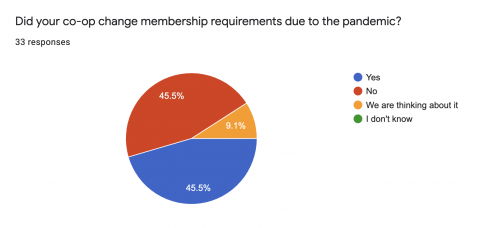
Group-equity housing cooperatives across the US and Canada have been working together to build solidarity, create financial support networks, and provide alternative housing solutions for most of the past century. Throughout the years, housing co-ops of this model -- where all property equity stays in the co-op to support long-term community sustainability -- have proven their ability to respond to economic crises. Although the current housing crisis and the compounded effects of COVID-19 offer a new set of challenges, group-equity housing co-ops have risen to meet that set of challenges through several direct responses.
The North American Students of Cooperation (NASCO) is the bi-national federation that links group-equity housing co-ops across the US and Canada. As the entity that both links these co-ops and provides direct support through property leasing, development support, education, and crisis response, NASCO has witnessed the unique way that group-equity co-ops have held to their values of mutual aid and solidarity throughout the pandemic.
NASCO surveyed its network of co-ops in March 2020 and again in July 2021. The most recent survey gathered 31 responses from housing co-ops across the US and Canada, ranging from 3 members to 1,100 members.
While living in a congregate setting has been undeniably difficult this year, co-ops retained most of their members through the pandemic; 55 percent of co-ops estimate their lowest occupancy in the past year to be 60 or 75 percent. A similar percentage of respondents (54%) estimate that their co-op had less than 10 percent of their membership move out due to COVID-19. Of those move-outs, co-ops report experiencing both permanent (46%) and a mix of permanent and temporary (50%) move-outs equally.
Co-ops experienced varying degrees of unemployment among members due to the pandemic, from 0 to 75%. Survey results indicated that 71% of responding co-ops have halted evictions for non-payment, waived rents, or taken similar measures throughout the pandemic.
As COVID-19 spread, NASCO member co-ops responded quickly by setting health and safety protocols and policies for their houses and buildings. Almost exactly 50% of responding co-ops had members test positive for COVID. Mask mandates in shared spaces are almost universal across co-ops. Each co-op created policy regarding quarantine protocols, including but not limited to isolation spaces and meal or grocery delivery systems.
Mask mandates in shared spaces are almost universal across co-ops. Each co-op created policy regarding quarantine protocols, including but not limited to isolation spaces and meal or grocery delivery systems.
Generally, co-ops did not stop permitting new residents to move in during the pandemic (82%). While most co-ops who responded to NASCO’s survey allowed move-ins, many communities (45%) changed their membership requirements. The most common change required potential residents to agree to follow the co-op’s COVID procedures and policy; more recently, co-ops have asked members to get vaccinated or continue to wear masks in shared spaces. Some co-ops also require a negative test upon move-in.
Some of the new costs responding co-ops reported were PPE, increased food budget (with people staying home more), lost labor due to sickness or exposed individuals in isolation, paid staff time off for COVID illness, unpaid and forgiven rent or utilities, higher internet costs to accommodate work and schooling from home, and an increased volume of cleaning supplies.
While the lack of in-person interaction was undoubtedly detrimental to cooperative living communities, some co-ops reported positive changes that they anticipate continuing. One co-op created an entirely online membership application process that will continue to exist. Others began to gather outdoors more frequently, with bonfires and movie nights. Some co-ops found that they prefer to hold their house meetings online and will continue to do so in the future due to increased accessibility. Other co-ops felt that in-person meetings are necessary to their community and will return to gathering together when safe.
Some co-ops found that they prefer to hold their house meetings online and will continue to do so in the future due to increased accessibility. Other co-ops felt that in-person meetings are necessary to their community and will return to gathering together when safe.
From now on, some co-ops plan to ask about vaccination and COVID safety practices in the membership application process. Generally, vaccines are not a move-in requirement but will be considered in the application process. Additionally, certain co-ops plan to continue to stock masks, and more frequent cleaning cycles are widely a permanent change.
To say that group-equity housing co-ops are thriving during a housing crisis and pandemic would be a stretch. However, this network of co-ops has prioritized preserving and supporting their residents and have done an outstanding job.
